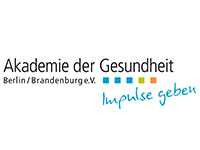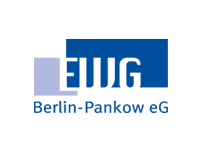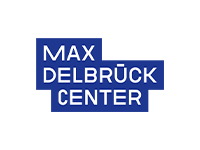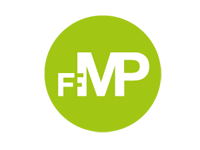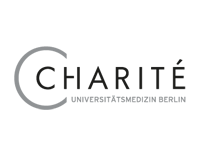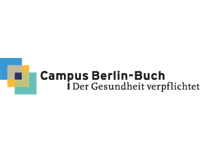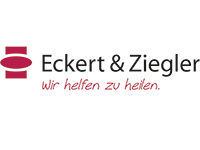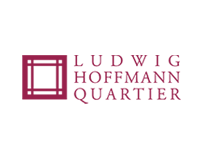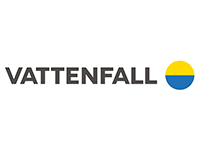Your selection
Research, Innovation, Patient care / 17.08.2022
Made in Berlin - Senator of Economics Schwarz visits Campus Buch
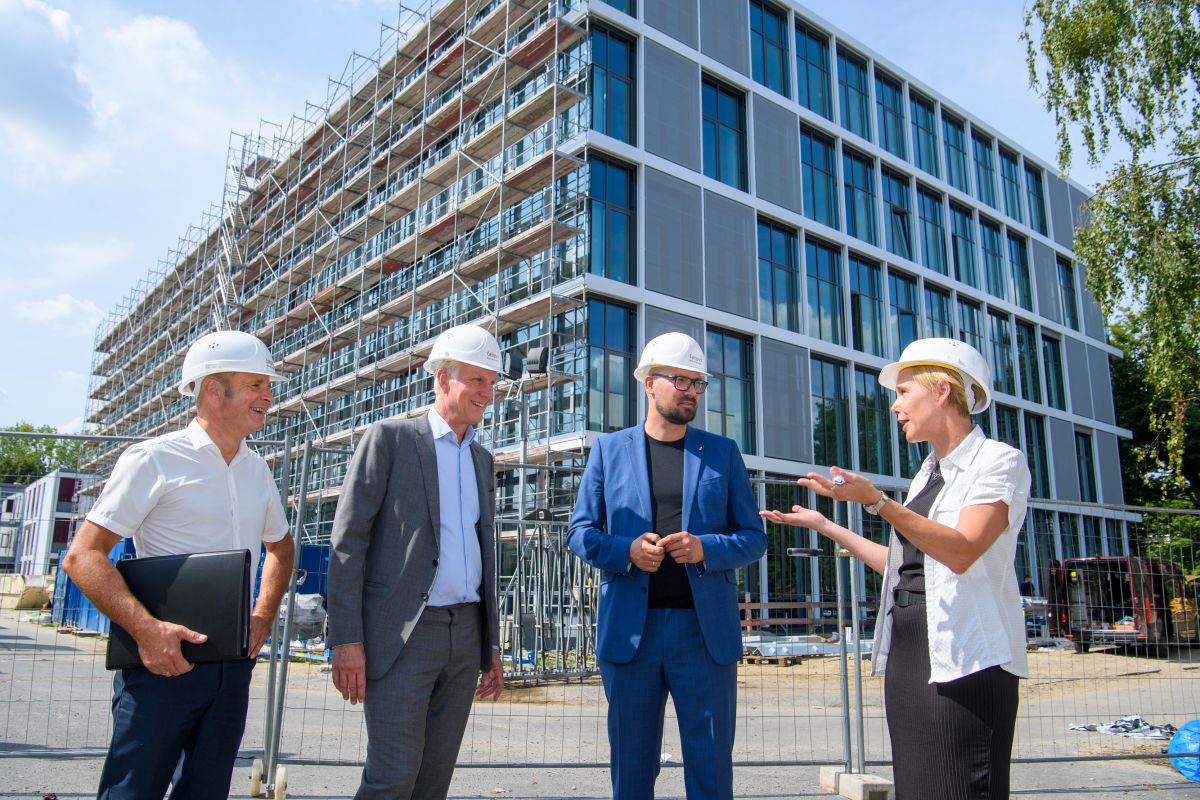
Berlin's Senator for Economics Stephan Schwarz joined State Secretary Michael Biel on August 17, 2022 to learn about the economic development of the Berlin Buch Science and Biotech Campus. During his tour, he also spoke with researchers from the MDC and ECRC about their spin-off projects.
Berlin-Buch is one of the eleven “Zukunftsorte” in Berlin with a high potential and space for innovation. On the biomedical research campus, excellent scientists from all over the world are working on the medicine of the future. In the BiotechPark Berlin-Buch, spin-offs from campus research institutions demonstrate how science can be turned into business.
As part of the "Made in Berlin" company tour, Stephan Schwarz, Senator for Economics, Energy and Public Enterprises of the State of Berlin, visited successful companies at the BiotechPark together with State Secretary Michael Biel on August 17, 2022 and learned about promising spin-off projects of research teams at the Max Delbrück Center for Molecular Medicine (MDC).
Close network for health
For decades, research and healing, invention and therapy have been combined at the health location Berlin-Buch. Here, established companies work alongside start-ups in the life sciences, and teams of doctors and researchers work hand in hand. Internationally renowned research institutions such as the MDC and the Leibniz-Forschungsinstitut für Molekulare Pharmakologie (FMP), the Charité – Universitätsmedizin Berlin, the Berlin Institute of Health in the Charité (BIH), as well as biotechnology companies and clinics form a network. Building on initial spin-offs in the early 1990s, the campus is now one of the largest biotech parks in Europe. With a clear focus on biomedicine, it covers the entire value chain from discovery and development to the production of marketable innovations and has outstanding growth potential.
Since 1992, more than 600 million euros have been invested in research and biotech infrastructure on the campus by the EU, the federal government and the state. "Quite decisive for the economic success of our campus is the close connection between basic and clinical research, state-of-the-art technology platforms and the goal of bringing biomedical findings into application," said Dr. Christina Quensel, managing director of the campus' operating company.
A visible sign of the ongoing growth is the construction of the BerlinBioCube, a new incubator center in the BiotechPark. The "BerlinBioCube" will open in 2023 and offer 8,000 square meters of state-of-the-art laboratory and office space for start-ups in biotechnology, medical technology and related fields. When it is completed next year, around 30 startups will be able to begin operations and create up to 400 jobs. Dr. Ulrich Scheller, managing director of Campus Berlin-Buch GmbH, and Dr. Quensel informed the visitors about plans for the expansion of the campus, the extension of the BiotechPark to approximately 9 hectares in the immediate vicinity, in order to enable the expansion of local companies and additional settlement of biotech companies.
Made in Berlin - Made in Buch
The program included a visit to the laboratories of T-knife, a spin-off of the MDC together with the Charité. T-knife, whose technology for novel immunotherapies against cancer is based on decades of basic research at MDC, is one of the most successful start-ups in the biotech scene. The young company is able to modify the patient's T-cells so that they can identify cancer cells as invaders. T-knife's goal is to cure cancers with the help of genetically modified immune cells. In 2021, T-knife raised $110 million from international investors.
The second stop led to emp Biotech GmbH. The company was founded in 1993 and was among the first in the BiotechPark. Strongly grown, emp Biotech is now a leading manufacturer of reagents for oligonucleotide synthesis, fine chemicals and chromatography materials – products for the early phase of research and development up to large-scale production in the pharmaceutical and biotechnology industries.
MDC Board of Directors: we support spin-offs
At the Max Delbrück Center, Scientific Director Professor Thomas Sommer (acting) and researchers PD Dr. Uta Elisabeth Höpken and Dr. med. Verena Schöwel-Wolf presented two promising spin-off projects. Uta Höpken's research group is using designer immune cells to develop a cellular immunotherapy that can combat leukemias and lymphomas more specifically. The start-up project MyoPax of the MDC-Charité team of Prof. Simone Spuler, presented by Dr. Schöwel-Wolf, uses its innovative muscle stem cell technology to develop regenerative therapies for previously incurable muscle diseases. "At the MDC, we systematically support such innovative projects and spin-offs. We want to bring our research to patients quickly and in this sense encourage an entrepreneurship culture," said Thomas Sommer.
Finally, Economics Senator Schwarz and State Secretary Biel visited Eckert & Ziegler Strahlen- und Medizintechnik AG, which also has its origins on campus and is now one of the largest suppliers of isotope technology components for nuclear medicine and radiation therapy with more than 900 employees. The company offers services for radiopharmaceuticals at its worldwide locations, from early development to commercialization, and is listed on the SDAX of the German Stock Exchange.
In conclusion, Senator Stephan Schwarz said, "I am fascinated to have this biotechnology and life science location in Berlin. It is certainly one of the drivers of economic development."
Overview News
News Buch Berlin
From cell biology to CRISPR/Cas – new knowledge for schools
The Life Science Learning Lab at the Berlin-Buch research campus offers both school students and teachers the opportunity to immerse themselves in science. This year, the facility celebrates its 25th ...
more ...ERC grants Berlin scientists € 2.5 million each
Neuroscientists Gary Lewin and James Poulet at the Max Delbrück Center for Molecular Medicine have won highly coveted and competitive ERC Advanced Grants to study pain and the neural mechanisms that u...
more ...The Protein Expert
Prof. Dr. Fan Liu from the Leibniz-Forschungsinstitut für Molekulare Pharmakologie (FMP) has recently received several awards for her contributions to the field of cross-linking mass spectrometry.
more ...Events Buch Berlin
19.04.2024, 08:30
Lehrkräftekongress: Gemeinsam Schüler:innen für Naturwissenschaften begeistern - gemeinsam Zukunft gestalten
Der Verband der Chemischen Industrie e.V., Landesverband Nordost, das Max Delbrück Center, das Leibniz-Forschungsinstitut für Molekulare Pharmakologie im Forschungsverbund Berlin e.V., das Gläserne La...
more ...21.04.2024, 16:00
Großes Sinfoniekonzert "Durch die Nacht zum Licht"
Saisonauftakt der Bürgersinfonie mit Werken von Beethoven, Mendelssohn Bartholdy und Berwald
more ...23.04.2024, 11:00
Kostenlose öffentliche Fahrrad-Codierung
Das Präventionsteam des Polizeiabschnittes 14 ist auf dem Campus Berlin-Buch und codiert kostenlos Fahrräder
more ...